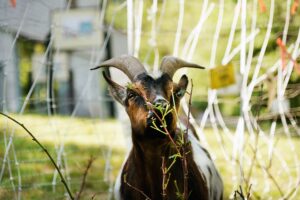EASTHAM — Dragon, Wizard, Myles, and little Bleu have spent the last two weeks eating invasive poison ivy, bittersweet, and autumn olive behind the Eastham Public Library on Samoset Road. The quartet of male goats, like any contractors worth their salt, won’t leave until the job is completed, which will likely be by the end of this week.

On the gentle slope between the library’s newly renovated building and the shores of neighboring Depot Pond, Goat Green Cape Cod owner Stacey Greaves has set up an electric fence around an area measuring roughly 50 by 150 feet. Inside their enclosure, the goats are hard at work clearing leafy treats. All they need from human caretakers is daily water, Greaves said.
“Some of the plants encroach on the library land where children play,” Greaves said. The goats will push the growth back and “take off some of the overwhelmingness” for the library’s volunteer gardeners, who have been managing the vegetation by hand since the new building opened in 2016.
Light-footed and strong of stomach, goats can be effectively deployed as an alternative to using chemical herbicides on brush, though given the location of the overgrown area next to the pond, herbicides were never on the table, said Library Director Melanie McKenzie.
Goats’ grazing radius is higher off the ground than sheep and cows, making them adaptable to steep and uneven terrain. And their intestines break down unwanted seeds like nobody’s business. Their overall clearing speed depends on the weather, Greaves said. On beautiful days, the workday sails by, while rain and scorching heat both slow down the munching.

“The Friends of the Eastham Library are thrilled to be sponsoring this unique project,” McKenzie wrote to the Independent. “They are not especially interested in knotweed, unfortunately,” she added. A ground-cover solution for the library’s invasive knotweed is still being discussed by the open space committee. Greaves said goats prefer knotweed in “earlier stages of growth.”
Greaves has 20 goats on staff at her company, which she founded in 2015. She was inspired by her love of animals but also by the idea of “helping keep herbicides off the ground in Cape Cod,” she said. Last season, Greaves said, she had approximately 40 clients during the season from mid-May through October and 80 projects on the goat waiting list.
At the library, she’s made sure to personally visit the four goats or have a volunteer go every day since they arrived on May 15. “I make sure they’re okay before the library opens.”
The library’s gardening volunteers first brought the idea of using goats for vegetation management to McKenzie. After Greaves came to the library for a site visit in late January, McKenzie filed for approval from the conservation commission.
At a March 28 meeting, someone raised a question about goat poop: would it run into the pond? But Conservation Agent Keith Johnson explained that the goats’ veggie-heavy fecal matter was “almost essentially pre-composted vegetative material” — essentially, a natural fertilizer. The request was approved unanimously.
According to McKenzie, the library’s contract with Greaves cost $1,450.

This is not the first time that Greaves’s goats have managed vegetation on the Outer Cape. In June 2021, they were deployed in Provincetown at the behest of the open space committee to clean up the overgrown community garden in the West End. But two days after their arrival, the six goats on the job escaped. A spontaneous herding effort ensued, and after the fracas, Greaves returned the naughty flock to Barnstable.
A fence failure was the cause of that breakout, Greaves said. “It doesn’t happen often, but they know when the fence is off, for starters,” she said. That’s part of why people are not allowed to enter the enclosure and pet the goats while they’re on a job, she said.
Eastham has hired a goat quartet before. In 2011, the dept. of public works adopted four goats to help clear invasive plants around Wiley Pond and other areas. But a year later, the goats were returned to the Cape and Islands Farm Bureau, according to news reports at the time.
Using freelance goats seems easier. Goat vegetation management operations need to be carefully managed to incite heavy trampling and consumption in the areas you want to clear. But once these master mowers finish the job, they get antsy.
“In the event they finish up before I get there, volunteers are instructed to give them grain and hay,” Greaves said. “I don’t want them ever to be hungry.”



